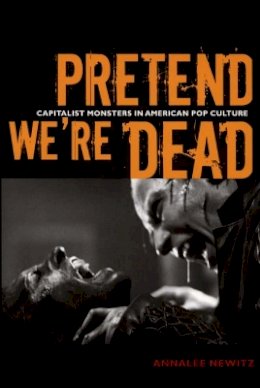
Pretend We´re Dead: Capitalist Monsters in American Pop Culture
Annalee Newitz
Newitz looks at representations of serial killers, mad doctors, the undead, cyborgs, and unfortunates mutated by their involvement with the mass media industry. Whether considering the serial killer who turns murder into a kind of labor by mass producing dead bodies, or the hack writers and bloodthirsty actresses trapped inside Hollywood’s profit-mad storytelling machine, she reveals that each creature has its own tale to tell about how a freewheeling market economy turns human beings into monstrosities.
Newitz tracks the monsters spawned by capitalism through b movies, Hollywood blockbusters, pulp fiction, and American literary classics, looking at their manifestations in works such as Norman Mailer’s “true life novel” The Executioner’s Song; the short stories of Isaac Asimov and H. P. Lovecraft; the cyberpunk novels of William Gibson and Marge Piercy; true-crime books about the serial killers Ted Bundy and Jeffrey Dahmer; and movies including Modern Times (1936), Donovan’s Brain (1953), Night of the Living Dead (1968), RoboCop (1987), The Silence of the Lambs (1991), and Artificial Intelligence: AI (2001). Newitz shows that as literature and film tell it, the story of American capitalism since the late nineteenth century is a tale of body-mangling, soul-crushing horror.
Product Details
About Annalee Newitz
Reviews for Pretend We´re Dead: Capitalist Monsters in American Pop Culture
D. Harlan Wilson,
Science Fiction Studies
“[A] sophisticated and rewarding Marxist analysis of the horror movie. . . . Where Newitz differs from any other writer on horror that I’ve read is in her insistence that her distinctively American, anti-capitalist tradition of horror begins not with the Enlightenment and its discontents, which find form in the European Gothic novel of the late-eighteenth and nineteenth centuries, but rather with the naturalist novel of the turn of the nineteenth and twentieth centuries. This is a startling and, at first sight, highly contentious position, but it’s one that Newitz argues rather brilliantly.”
Darryl Jones
Modernism/modernity
"[Newitz's] vast knowledge of cultural criticism, which she incorporates without a hint of ego, makes it work. Shifting seamlessly from a blow-by-blow account of Videodrome to a discussion of Catharine MacKinnon and Andrea Dworkin, Pretend We’re Dead is like an extended conversation with that U. of C. friend who, despite being frighteningly comfortable breathing the rarefied air of high theory, will still go see Snakes on a Plane with you."
Phoebe Connelly
Chicago Reader
